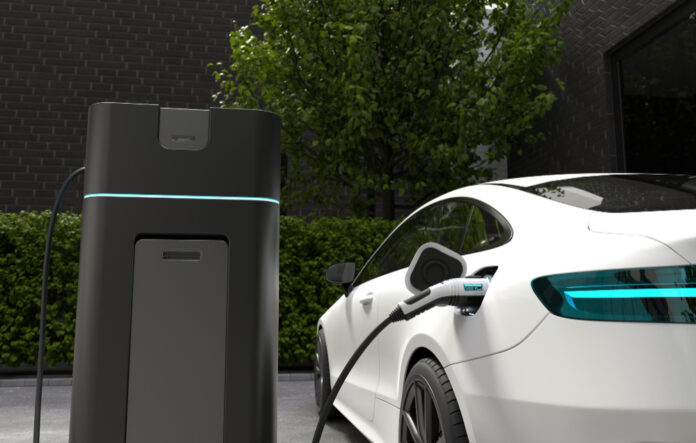National transportation solutions CEO highlights Saudi Arabia’s rapid vehicle growth, outpacing the US and Europe in commercial decarbonization and sustainable transportation
Saudi Arabia is rapidly emerging as a leader in the electric vehicle (EV) industry, particularly within commercial transportation, outpacing global EV adoption rates by a factor of ten, according to Gary Flom, CEO of National Transportation Solutions Co. (NTSC). Speaking at the EV Auto Show 2024 in Riyadh, Flom emphasized Saudi Arabia’s remarkable vehicle growth, achieving in five years what took the United States 25, solidifying the Kingdom’s position in sustainable transportation.
“Everything here is moving at light speed,” Flom remarked, noting that Saudi Arabia’s pace of EV development is unmatched, especially when compared to Europe and the United States.
This rapid advancement aligns with Saudi Arabia’s Vision 2030, a comprehensive initiative aimed at diversifying the Kingdom’s economy and reducing its reliance on oil. The government has set an ambitious target of making 30% of vehicles in Riyadh electric by 2030. To meet this goal, Saudi Arabia is investing heavily in EV infrastructure, including the development of public charging stations and policies designed to promote EV adoption.
Embed from Getty ImagesIn addition to these infrastructural investments, Saudi Arabia is working closely with international partners to build a complete EV supply chain, from sourcing raw materials for battery production to improving local manufacturing capabilities.
While transforming the passenger vehicle market remains a challenge, Flom expressed confidence in the commercial transportation sector’s ability to decarbonize quickly. “Commercial vehicles are easier to transition because we understand their usage patterns—where they go, how much they carry, and how to design the infrastructure they need,” he explained. Flom also noted that Saudi Arabia’s vehicle growth in the commercial sector has been a driving force behind its rapid progress in decarbonization efforts.
NTSC has taken the lead with its decarbonization roadmap, which helps government and private fleet operators move from internal combustion engine (ICE) vehicles to electric and hydrogen-powered alternatives. The roadmap offers a comprehensive plan, including carbon baseline measurement, charging infrastructure solutions, and advanced vehicle maintenance using cutting-edge software.
“Our decarbonization roadmap provides fleets with an organized, cost-effective pathway to transition from ICE vehicles to cleaner energy,” Flom noted. He added that this initiative also provides accredited carbon reduction data, which is vital for Saudi Arabia’s growing carbon credit trading system.
NTSC’s decarbonization strategy has already led to key partnerships with major players like J&T Express, Saudi Bulk Transport (SBT-SENDDEX), and UPS. These collaborations were announced at the event and aim to promote decarbonization across the Kingdom. “Our partnerships with SBT-SENDDEX and Electromin reflect our dedication to advancing sustainable transportation,” said Flom, highlighting the alignment of these efforts with the UN Sustainable Development Goals.
Additionally, NTSC has introduced innovative technologies such as DarbConnect, a proprietary fleet management software utilizing the Internet of Things (IoT). This platform provides real-time GPS tracking, predictive maintenance, and other data-driven services that enhance efficiency and reduce costs for fleet operators. “DarbConnect has been a huge success, signing up over 330 customers and securing 35% of the commercial fleet market in less than two years,” Flom revealed.
While the commercial EV sector is progressing rapidly, Flom acknowledged that decarbonizing the passenger vehicle market poses more challenges due to the varied use patterns of private vehicles. Unlike commercial fleets, passenger vehicles are harder to predict, complicating the development of a standardized charging infrastructure.
Looking forward, Flom expressed NTSC’s ambitions to expand its leadership in sustainable transportation across the Middle East and North Africa. “We aim to become a regional leader in fleet management and sustainable mobility, and we plan to export our expertise beyond Saudi Arabia,” he concluded. He highlighted that Saudi Arabia’s vehicle growth in the EV sector will play a crucial role in achieving these goals and enhancing regional sustainability initiatives.
Analysis
Political: Saudi Arabia’s rapid expansion in the EV sector aligns with the country’s Vision 2030, a blueprint to modernize its economy and reduce its dependence on oil. The push for a 30% electrification rate in Riyadh by 2030 reflects the government’s commitment to environmental sustainability, placing Saudi Arabia at the forefront of green transportation initiatives. This move may influence political relations, particularly with countries and organizations focused on climate change and sustainability. As Saudi Arabia transitions to an EV-based economy, it strengthens its position as a global leader in energy diversification, potentially affecting its diplomatic standing and trade negotiations.
Social: The EV sector’s growth is reshaping Saudi society by promoting environmental awareness and sustainability. This shift may influence social behaviors, encouraging citizens to adopt cleaner transportation alternatives. As public charging stations become more accessible, the convenience of EVs will appeal to a broader demographic, particularly in urban areas like Riyadh. Additionally, the government’s focus on creating a sustainable EV ecosystem may inspire other countries to follow suit, furthering global social trends toward decarbonization. Saudi Arabia’s EV boom can serve as a model for other nations looking to balance rapid modernization with environmental responsibility.
Economic: Economically, Saudi Arabia’s rapid EV development presents vast opportunities. By investing heavily in EV infrastructure and manufacturing, the Kingdom is positioning itself as a regional hub for green technologies. This will likely attract foreign investment and partnerships, fostering growth in sectors like technology, energy, and logistics. Additionally, the shift from oil-based to electric vehicles diversifies the economy, reducing dependency on fluctuating oil prices and contributing to long-term economic stability. NTSC’s decarbonization roadmap and partnerships with major transportation players demonstrate the potential for significant economic growth in the commercial transportation sector, while the introduction of carbon credit trading could open new financial markets within the Kingdom.
